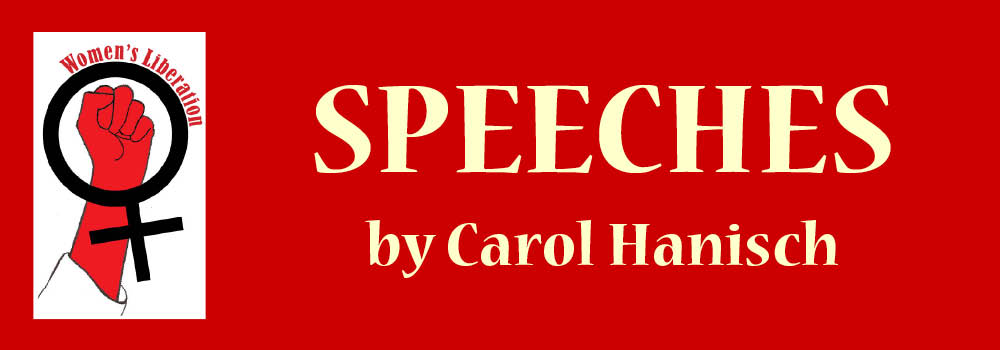

How to Defang a Movement:
|
Telltale Words: Depoliticizing the Women’s Liberation Movement The Descent from Radical Feminism to Post-Modernism Women’s Liberation Is Based on Sex, Not Gender
|
Title of SpeechWhere Have All the 60s Gone?This
speech was presented at a panel, “Where Have All the ‘60s Gone? Activism in the
‘60s and Strategies for the ‘70s” at Vassar College in Poughkeepsie, New York,
November 21, 1978, sponsored by the New York Public Interest Research Group
(NYPIRG). It appeared in MEETING GROUND, #6, June 1979.
|
Short Excerpt
...“I wish to start out by
stating that the goal of my activism, generally speaking, has been the
overthrow of capitalism, male supremacy and racism and the establishment of a
classless society where all privilege is abolished. What I want is a government
and an economic system truly of, by and for the people all the people whose
labor and creativity feeds us, clothes us, houses us, entertain us, and in
every way makes life better for us”.
|
Using History to Make History:Learning from Our SuccessesThis
speech was the keynote address at the University of Florida (Gainesville) Women’s
History Month activities on March 27, 1996. It appeared in Frankly Feminist: A Collection of Writings
from the Hudson Valley Woman 1991-1995 by Carol Hanisch.
|
..."In this Women's History Month, I want to talk a little about what was done right-- from the experience, the history-- that I lived through and helped make"... ..."I want to make very clear that we didn't start the Women's Liberation Movement back in the 1960s because we hated men...but because we hated being oppressed. Men were often the ones doing the oppressing and we wanted them to stop it".... |
A
Women's Liberation Tribute to William Hinton and the Women of Long Bow
Presentation
at Columbia University, April 3, 1999, on a panel entitled Understanding China’s
Revolution: A Celebration of the Lifework of William Hinton. Co-sponsored by the China Study Group, Columbia University East Asian Institute,
Monthly Review Magazine, US-China Peoples Friendship Association, China and the
World Magazine, and friends of Bill Hinton on the occasion of Hinton's 80th
birthday.
|
"I’m sure that when the peasant women of Long Bow held their “speak bitterness” meetings about their oppressors, they never dreamed that their method of struggle would help inspire women half way round the world to do the same." "And when Bill Hinton wrote about those meetings in his chapter on “Half of China” in Fanshen, I bet he never dreamed his report would be one of the several sparks that would help light the prairie fire of women’s liberation in this country. But it did. We called that spark consciousness-raising, adapted it to our own conditions, and it became the primary organizing tool of our movement, a radical weapon against male supremacy."... |
Impact of the Chinese Cultural Revolution on the Women’s Liberation Movement
Delivered at a panel at a 30th Anniversary Symposium on “China’s Great Proletarian
Cultural Revolution” at the New School for Social Research in New York on
December 14, 1996, an event organized by the China Study Group and co-sponsored
by Monthly Review and the Economics Students Union of the New School. The panel
on “Impact of the Cultural Revolution Outside China” was moderated by Bertell
Ollman and also included Amiri Baraka, Robert Weil, Paoyu Ching and Peter
Kwong.
|
"Many of us radical feminists soon discovered Mao was easier to read than Marx, Engels and Lenin, and what he had to say was both concrete and relevant to our own struggle. Besides, the male Left was using Marx, Engels and Lenin to bludgeon radical women theoretically about how wrong we were to try to start an independent women’s liberation movement that dealt directly and exclusively with women’s oppression. Later, when we went to these original sources (which were also Mao’s original sources) and read them for ourselves, we discovered much of what had been quoted at us wasn’t quite accurate or had been taken out of context and wasn’t quite applicable." ... |
What's Wrong with Feminist Theory Today and What it Will Take to Make it Successful Again
|
"When we started the Women’s Liberation Movement, we had our own personal experience as women to do consciousness-raising about. Now those who participate in the Women’s Liberation Movement also have movement experience to do consciousness raising about. We can critique our actions, our theory and our movement in a consciousness-raising way and know that we are well grounded in reality ..." "There is the problem that traditionally feminine behaviors—including those ...techniques all women learn in order to survive in a man’s world—have been dressed up and sold back to us as “feminist values.” They assure that women’s ability to struggle against our oppression is diminished rather than encouraged." ... "Today many feminist historians are accusing the early Women’s Liberation Movement of having been racist and homophobic. That does not at all fit my experience." ... |